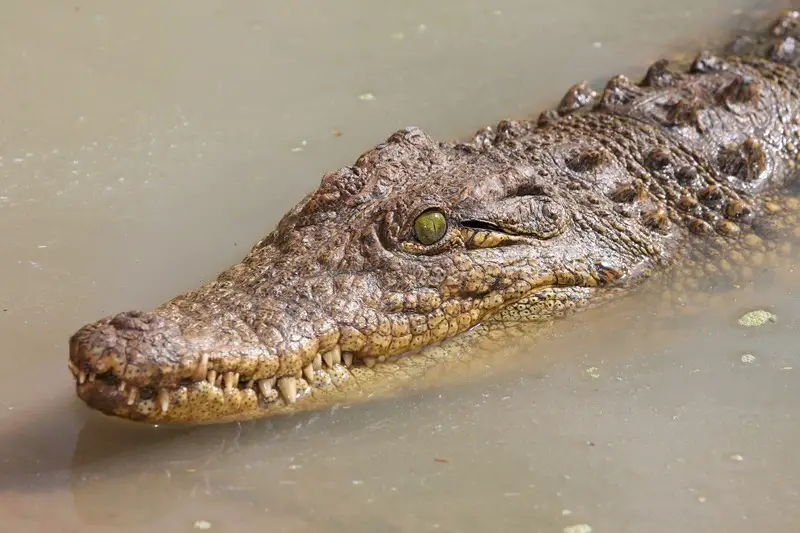M. Yunus, a 68-year-old grandfather from Aceh province, Indonesia, was killed by a crocodile while bathing in the Peureulak River near his home on August 29, 2024. The incident has highlighted the growing threat of crocodile attacks in the region, where human activities and environmental changes have brought these prehistoric predators into closer contact with local communities.
Yunus had told his wife Dimyam, 64, that he was going to bathe in the river behind their house. When he failed to return after several hours, Dimyam went to check on him, finding only his clothes and mobile phone on the riverbank. She immediately alerted local authorities and family members.
Iptu Andi Ananta Grilya Utama, Ranto Peureulak Police Chief, said in a statement: “Suspecting that her husband had drowned, the victim’s wife then informed her son who lives in Langsa.”
Emergency services, rescue teams, and local volunteers searched the river but initially found no trace of Yunus. The search ended on August 30 when personnel from the East Aceh Regional Disaster Management Agency discovered his body about a mile downstream from where he had left his clothes. The corpse was caught in a wooden branch, and the entire upper half of Yunus’s body was missing.
Authorities believe Yunus was attacked and partially devoured by a crocodile. His remains were collected and taken home for a funeral, but his upper body, head, and arms have not been recovered.
On August 31, farm workers discovered a large dead crocodile along the riverbank, lying in the undergrowth at the edge of a palm oil plantation. Local resident Abdullah said, “We thought it was the crocodile that ate Yunus, so we cut it open but we found no human body parts inside.” He added, “People from Bhom Lama and Paya Meuligo villages now feel worried and reluctant to carry out their activities as usual around the river.”
The attack on Yunus is part of a disturbing trend in Indonesia, which has seen a sharp rise in crocodile attacks in recent years. The country has recorded over 1,000 attacks resulting in 486 deaths in the past decade, making it the global hotspot for such incidents.
Experts attribute this increase to a combination of factors, including habitat loss, overfishing, and human encroachment into crocodile territories. The Indonesian archipelago is home to 14 species of crocodiles, with a large population of extremely large and aggressive estuarine crocodiles thriving in the region’s climate.
Conservationists believe that crocodiles are being driven further inland and closer to villages due to the depletion of their natural food supplies caused by overfishing. This, combined with the loss of coastal habitats to farming and development, has created a perfect storm for human-crocodile conflict.
The situation is particularly dire in areas like Bangka Island, where illegal tin mining has devastated natural habitats and forced crocodiles to inhabit abandoned mining pits near human settlements. These artificial water bodies, created by mining activities, have become new habitats for crocodiles, bringing them into dangerously close proximity to local communities.
The Indonesian government has attempted to address the issue by legalizing some previously illegal mining operations and requiring miners to be responsible for habitat restoration. However, many experts are skeptical about the effectiveness of this strategy, citing weak enforcement and the continued expansion of mining activities.
Conservation groups like the Alobi Wildlife Rescue Centre are working to rescue and rehabilitate affected crocodiles, but their efforts are hampered by limited resources and the scale of the problem. The center struggles to accommodate the growing number of rescued crocodiles due to a lack of funding and space.
Local communities often resort to killing crocodiles after attacks, believing it to be a bad omen to relocate them. This practice, while understandable from a human safety perspective, further complicates conservation efforts and the delicate balance between human needs and wildlife preservation.
The attack on Yunus is not an isolated incident. Just a month earlier, a 54-year-old woman named Halima Rahakbauw was killed by a 13-foot crocodile while washing pots in a river in Wali village on the Maluku islands. In another recent case, a 63-year-old tin miner was killed by a crocodile near a river on Bangka island in Sumatra.
As human activities continue to encroach on crocodile habitats and alter the delicate ecological balance, experts warn that such conflicts are likely to persist unless comprehensive measures are taken to protect both human communities and the crocodiles’ natural environments.











